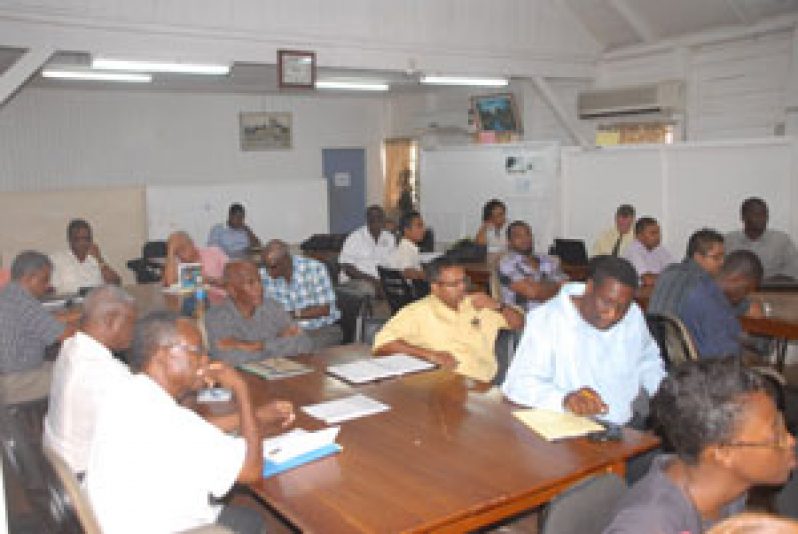 In this regard, a three-day planning workshop is underway, from May 13-15, 2013, with key stakeholders to develop a National TVET Strategic and Action Plan 2013 –2020 for Guyana, based on national priorities for economic development, competitiveness and productivity enhancement.
In this regard, a three-day planning workshop is underway, from May 13-15, 2013, with key stakeholders to develop a National TVET Strategic and Action Plan 2013 –2020 for Guyana, based on national priorities for economic development, competitiveness and productivity enhancement.This workshop, which is being held in the boardroom of the National Centre for Educational Resource Development (NCERD), in Kingston, is being facilitated by consultants from Dunn, Pierre Barnett and Associates in Jamaica.
Participants include representatives from agencies such as the Private Sector Commission, Go-invest, the University of Guyana, and the Ministries of Finance and Tourism, Industry and Commerce, as well as the Berbice and Georgetown Chambers of Commerce.
Speaking at the opening ceremony of the workshop, Education Minister Priya Manickchand said the groundwork for TVET in Guyana has already been laid by the People’s Progressive Party Civic (PPP/C) administration, and the ministry sees the move to develop this strategy as a very important one.
Manickchand said Guyana is on fertile ground to ensure that the vision of the administration becomes a reality, a task assigned to the Ministry of Education.
The ministry, she said, recognised that there’s a need for a more proactive approach in the area of technical and vocational education, and as a result they have built institutions and signed on to the programme for doing TVET.
Addressing the participants of the workshop, Minister Manickchand implored that they have a practical approach to the development of this strategy, by not only having discussions on great ideals and philosophical approaches, but by placing these in the local context.
This, she said, can be done by determining how these plans will work in Guyana, by considering both the country’s available as well as unavailable resources, while focusing on where Guyana is today and where they would like to see it in the next seven years.
Manickchand pointed out that while TVET is being offered in secondary schools across the country, they need to assess what they want from the children leaving those schools. She stated also that they want these students to have a deep interest in pursuing further studies, gaining certification as being competent in the areas in which they are trained. Moreover, they have to be absorbed in the local workforce to contribute to developing the country at a faster pace.
She stated also that they want these students to have a deep interest in pursuing further studies, gaining certification as being competent in the areas in which they are trained. Moreover, they have to be absorbed in the local workforce to contribute to developing the country at a faster pace.
Pointing out that Guyana is developing physically at a rapid pace, Manickchand said there is need to assess how they can ensure that women and girls are not left behind and what needs to be done in order to attract them to this field.
“What’s going to happen to our children, what are they going to be exposed to, where are they going to work when they come out, what kind of skills they’re going to have,” Minister Manickchand posited.
Meanwhile, giving a synopsis of the workshop, consultant and senior director of planning and operations at the University of Technology in Jamaica, Denise Stephenson-Hammil said that it will involve two phases of planning for the National TVET system in Guyana, the analysis and the planning stage.
According to her, the analysis phase is focused on the current situation of the TVET system in Guyana, its internal situation as well as its external operating environment.
Additionally, particular attention will also be paid to the key stakeholder groups such as employers, examining the vital role they play in ensuring the success of the system.
The vision and the mission for the system, which are both critical, will guide them over the seven-year period, as well as the critical strategic themes that will also be necessary for development.



.jpg)









